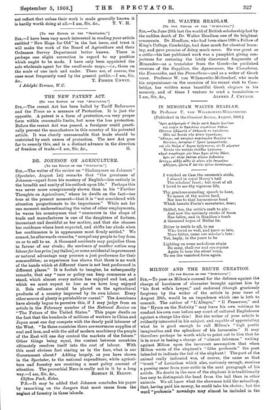DR. JOHNSON ON AGRICULTURE.
[TO THE EDITOR OF THY "SPECTATOR.")
SIR,—The writer of the review on "Shakespeare on Johnson" (Spectator, August 1st) remarks that "the greatness of Johnson—apart from his mastery of English—lies entirely in the breadth and sanity of his outlook upon life." Perhaps this was never more conspicuously shown than in his "Further Thoughts on Agriculture," where he dwells on the fact—too true at the present moment—that it is " not considered with attention proportionate to its importance." While not for one moment underestimating the value of other employments, he warns his countrymen that " commerce in the shape of trade and manufactures is one of the daughters of fortune, inconstant and deceitful as her mother, and that she chooses her residence where least expected, and shifts her abode when her continuance is in appearance most firmly settled." We cannot, he afterwards remarks, "compel any people to buy from us or to sell to us. A thousand accidents may prejudice them in favour of our rivals ; the workmen of another nation may labour for less price [my italics], or some accidental improvement or natural advantage may procure a just preference for their commodities ; as experience has shown that there is no work of the hands which at different times is not best performed in different places." It is foolish to imagine, he subsequently remarks, that any " care or policy can keep commerce at a stand, which almost every nation has enjoyed and lost, and which we must expect to lose as we have long enjoyed it. Sole reliance should be placed on the agricultural products of a country improved by its own labour. Every other source of plenty is perishable or casual." The Americans have already begun to perceive this, if I may judge from an article in the February number of the National Review on "The Future of the United States." This paper dwells on the fact that the hundreds of millions of workers in China and Japan must one day compete with the dearly paid labourer of the West. "In these countries there are enormous supplies of coal and iron, and with the aid of modern machinery the people of the East will one day control the markets of the future." Other things being equal, the contest between countries ultimately resolves itself into the cost of labour. With this most obvious fact staring us in the face, what is our Government about ? Adding largely, as you have shown in the Spectator, to the national expenditure, while agricul• hire and forestry are receiving a most paltry amount of attention. The proverbial Nero is really not in it by a long
.P.S.—It may be added that Johnson concludes his paper by remarking on the dangers that must ensue from the neglect of forestry in these islands.






































 Previous page
Previous page